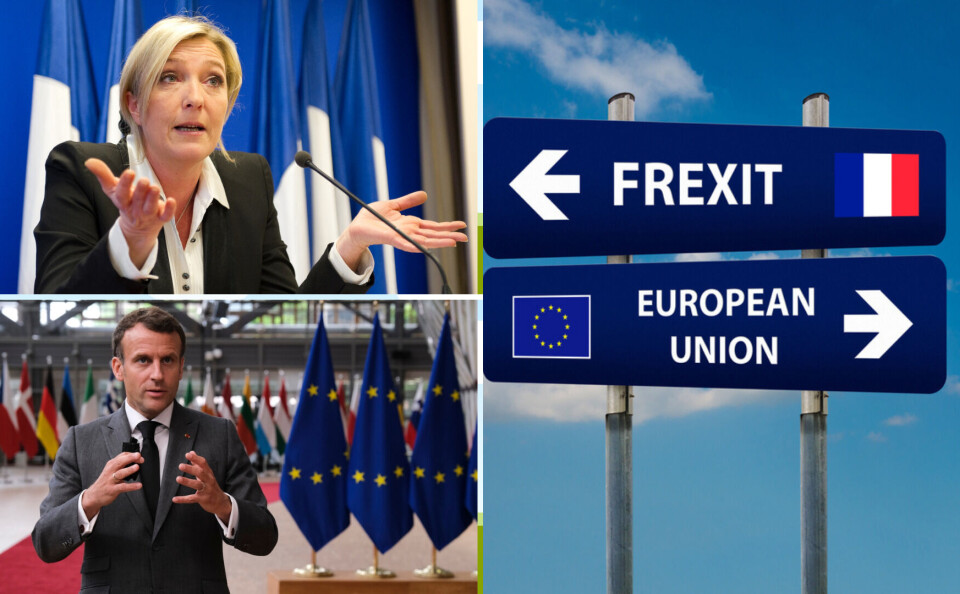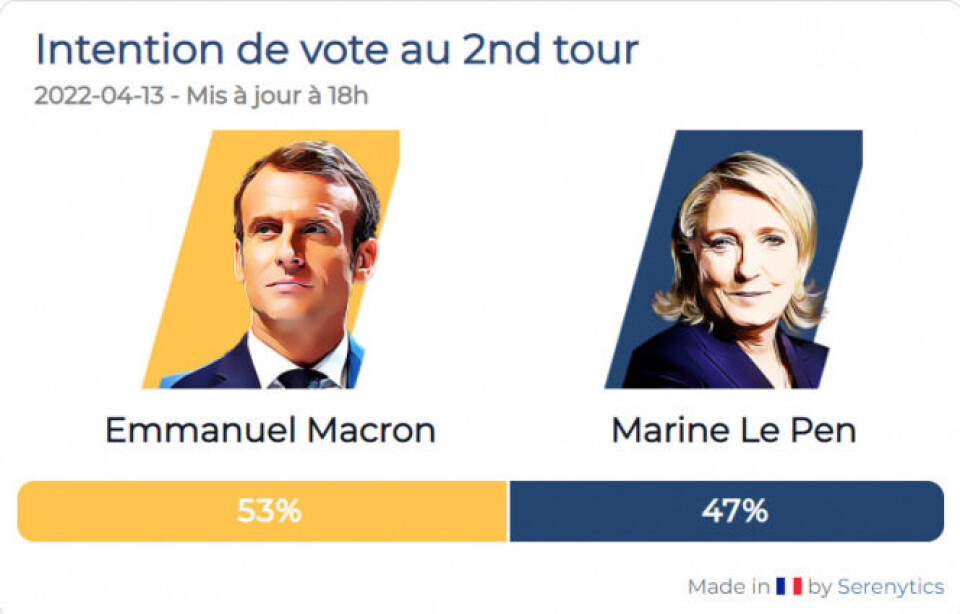-
Alps avalanche risk remains high and 1,000 homes without power after heavy snow
Rail and road traffic disrupted but confinement order lifted for residents of Tignes in Savoie
-
Flights to and from France not expected to be affected by Gatwick Easter strike
Travellers are still advised to check their flight details this weekend
-
Residents ordered to stay home due to high risk of avalanche in French Alps
One person has been injured in an avalanche in Val Thorens, while thousands of homes are without power
Le Pen praises Brexit; Macron and allies say she is hiding Frexit plan
The presidential hopeful claims she is no longer interested in France leaving the EU, but appreciates that the UK has been able to escape Brussels’ ‘straightjacket’

Far-right presidential hopeful Marine Le Pen may say she is no longer in favour of Frexit (France leaving the European Union), but her programme suggests otherwise, France’s government spokesman Gabriel Attal said today (April 14).
“Marine Le Pen is lying when she says she doesn't want to leave the European Union because she knows that if she leaves, it will cause carnage for all our companies,” Mr Attal told RMC.
“But she has a real Frexit programme. At some point, you have to look at her proposals because if she is elected, she will implement them. In her programme, there are all the conditions that mean that in practice, it is an exit from the European Union.”
Ms Le Pen states that she no longer wants France to leave the EU, as she had stated during the 2017 presidential election campaign.
Instead she now wants to “reform it from the inside”.
“The British got rid of the Brussels bureaucracy, which they could never bear, to move to an ambitious concept of global Britain,” she said during a press conference yesterday (April 13).
“This is not our project. We want to reform the EU from the inside,” she said.
“The more we free ourselves from the Brussels straightjacket while remaining inside the EU, the more we will open ourselves up to the wider world.
“It seems to me that’s what the English [British] understood well.”
She said she wanted to reduce France’s contribution to the EU budget by €5billion per year.
France currently pays in between €22 to €25billion, but after return investments ends up with a net contribution of around €8-9billion.
“I would not stop paying France’s contribution to the EU, I want to reduce it,” she said. “The EU can also make savings in its operating costs.”
Il est possible de réformer l’Union européenne de l’intérieur et de la faire évoluer vers plus de protection des peuples : le Frexit n’est nullement mon projet.
— Marine Le Pen (@MLP_officiel) April 14, 2022
👉🏻 https://t.co/G74OTZDHjV pic.twitter.com/M49fHaO5RL
She also talked about forming a stronger alliance with Poland and Hungary, two EU member states that frequently clash with Brussels over topics such as immigration, LGBT+ rights and the rule of law.
“Poland, Hungary and myself all probably share a common vision of the necessary transformation of the EU into an alliance of nations, as we do for the necessity of the primacy of national law over EU directives,” Ms Le Pen said.
If elected, Ms Le Pen wants to hold a referendum on whether EU laws should supersede national laws, as they currently do.
In October last year, the Polish Constitutional Tribunal ruled that EU law does not necessarily have primacy in Polish courts, representing a huge challenge to the functioning of the EU.
Read more: What is Le Pen’s ‘French nationals first’ policy and is it legal?
Ms Le Pen also spoke of ending the French-German military alliance within the EU and of cutting back France’s involvement in the military alliance Nato.
She has previously said that once the Russian-Ukrainian war is over, she will seek “the implementation of a strategic rapprochement between Nato and Russia”.
France currently holds the position of rotating presidency of the Council of the European Union, which it took up on January 1 this year and will keep until July 1.
If Ms Le Pen is elected, she will for a short time become the acting head of the presidency when she enters office, which is expected to be on May 13.
Macron says election is ‘battle for Europe’
Incumbent president Emmanuel Macron, who will face Ms Le Pen in the second round of the elections on April 24, said on Tuesday that the result would determine the fate of the EU.
“Marine Le Pen wants to leave the EU but she does not dare to say it,” he said.
“The battle that we are currently fighting is not only for France, but for Europe.
“Because the project of the extreme right is one that hides intentions to leave Europe, a Europe of peace.
“You will see me opposing this project with all my force because [what Ms Le Pen is proposing] is a return to nationalism and a return to war. Never.
“The Europe we have is not an alliance of nations that want to wage war against each other, it is a project of respect that has put an end to the dreams of empires that have always fractured us.
“And dreams of empires are coming back: it's Russia's dream today, it's the dream of some others, it's the conflict of those who would have us believe that the solution for France is to leave Europe, because it would mean going to fight other Europeans.
“[Le Pen] says she will not pay the bill for the club [the 27-member EU], and that she will change the rules of the EU on her own…This really means that she wants to get out, but no longer dares to say so.”
Read more: Sport stars in France urge voters to stop Marine Le Pen winning
Le Pen’s post-Brexit UK alliance ‘ignorant’ - former British ambassador to France
Lord Peter Ricketts, the UK’s former ambassador to France, has criticised Ms Le Pen’s plans for a new partnership with post-Brexit Britain as “nonsense, superficial and completely misunderstanding the basis of France’s cooperations with all her allies”.
He said Ms Le Pen’s plans, laid out in her manifesto, to seek closer ties to the UK while putting distance between its main strategic partners, the US and Germany, are “dangerous”.
“It is a recipe for disaster for France,” he told The Guardian.
“There is a lingering assumption in her proposals that a Brexit Britain will be a natural ally for a nationalist Le Pen France.
“But what her proposals bring out is that France under her leadership would be a very dangerous ally for the UK with her plan of leaving the Nato military command structure, renegotiating its alliance with America, being much more nationalistic in its purchase of defence equipment and continuing a strategic partnership with Russia in all sorts of areas.
“It is frankly inconceivable that she would be able to drive a wedge between the US and the UK.
“No British government or indeed any Nato ally is going to touch a defence relationship with France on those grounds. It shows a complete misunderstanding if she thinks Britain would be interested in a defence relationship on Le Pen’s basis.
“France’s closest military allies are the US, the UK and Germany, yet her suggestion is that the foundations of all these agreements can and will be changed. It is a recipe for complete isolation for France.
“Apart from her relationship with Russia, I don’t see how any of France’s traditional alliances would survive her presidency. It would have been far better if she had been honest in her defence manifesto and replaced the union jack with the Russian flag, because that is the only potential ally she is likely to find.”
Macron gaining in the polls
Mr Macron will face Ms Le Pen in the presidential election run-off on April 24 in a repeat of the 2017 election.
Read more: French election: The chase is on for Mélenchon’s 7.7 million voters
An early Ifop poll published the night of the first round (April 10) had the two candidates neck-and-neck, with Mr Macron on 51% and Le Pen on 49%.
But Mr Macron’s lead is slowly stretching. Ifop’s rolling poll, which is updated daily, shows Mr Macron on 53%.

Credit: ifop.com/presidentielle-2022
Related articles
‘Macroner’: The new Ukrainian word for French president’s Putin calls
Macron - Le Pen: What do they each pledge to change if elected?
'Macron or Le Pen: It's like choosing between the plague or cholera'
























